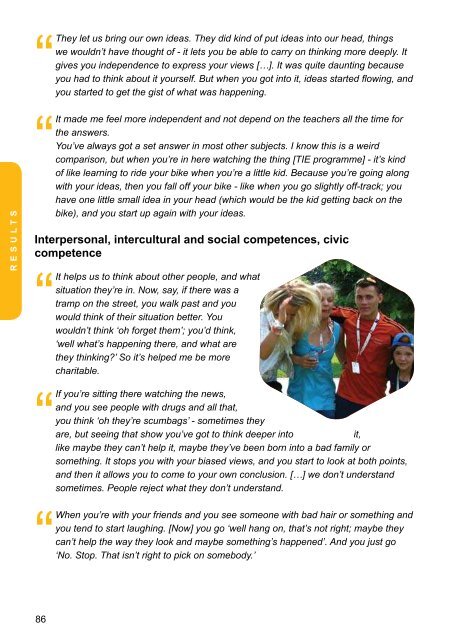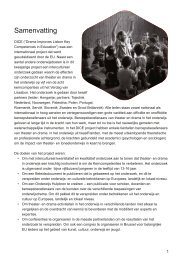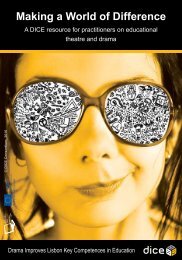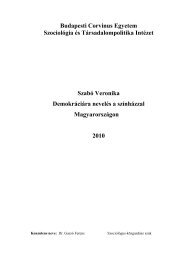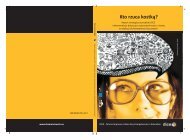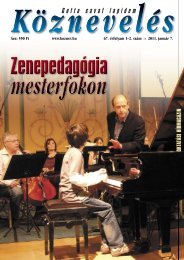Policy Paper - Drama Improves Lisbon Key Competences in Education
Policy Paper - Drama Improves Lisbon Key Competences in Education
Policy Paper - Drama Improves Lisbon Key Competences in Education
You also want an ePaper? Increase the reach of your titles
YUMPU automatically turns print PDFs into web optimized ePapers that Google loves.
Entrepreneurship<br />
“<br />
We were able to make decisions. Try<strong>in</strong>g to put our po<strong>in</strong>t of view across - it helped us.<br />
I thought it was k<strong>in</strong>d of daunt<strong>in</strong>g at first. Usually <strong>in</strong> school it’s like teachers lead you<br />
along, and then when you get th<strong>in</strong>gs like that [the TIE programme], when they ask<br />
you – ‘well what do you th<strong>in</strong>k’ – it’s k<strong>in</strong>d of ‘stand on your own two feet’.<br />
R e s u l t s<br />
“<br />
They let us br<strong>in</strong>g our own ideas. They did k<strong>in</strong>d of put ideas <strong>in</strong>to our head, th<strong>in</strong>gs<br />
we wouldn’t have thought of - it lets you be able to carry on th<strong>in</strong>k<strong>in</strong>g more deeply. It<br />
gives you <strong>in</strong>dependence to express your views […]. It was quite daunt<strong>in</strong>g because<br />
you had to th<strong>in</strong>k about it yourself. But when you got <strong>in</strong>to it, ideas started flow<strong>in</strong>g, and<br />
you started to get the gist of what was happen<strong>in</strong>g.<br />
“<br />
It made me feel more <strong>in</strong>dependent and not depend on the teachers all the time for<br />
the answers.<br />
You’ve always got a set answer <strong>in</strong> most other subjects. I know this is a weird<br />
comparison, but when you’re <strong>in</strong> here watch<strong>in</strong>g the th<strong>in</strong>g [TIE programme] - it’s k<strong>in</strong>d<br />
of like learn<strong>in</strong>g to ride your bike when you’re a little kid. Because you’re go<strong>in</strong>g along<br />
with your ideas, then you fall off your bike - like when you go slightly off-track; you<br />
have one little small idea <strong>in</strong> your head (which would be the kid gett<strong>in</strong>g back on the<br />
bike), and you start up aga<strong>in</strong> with your ideas.<br />
Interpersonal, <strong>in</strong>tercultural and social competences, civic<br />
competence<br />
“<br />
It helps us to th<strong>in</strong>k about other people, and what<br />
situation they’re <strong>in</strong>. Now, say, if there was a<br />
tramp on the street, you walk past and you<br />
would th<strong>in</strong>k of their situation better. You<br />
wouldn’t th<strong>in</strong>k ‘oh forget them’; you’d th<strong>in</strong>k,<br />
‘well what’s happen<strong>in</strong>g there, and what are<br />
they th<strong>in</strong>k<strong>in</strong>g?’ So it’s helped me be more<br />
charitable.<br />
“<br />
If you’re sitt<strong>in</strong>g there watch<strong>in</strong>g the news,<br />
and you see people with drugs and all that,<br />
you th<strong>in</strong>k ‘oh they’re scumbags’ - sometimes they<br />
are, but see<strong>in</strong>g that show you’ve got to th<strong>in</strong>k deeper <strong>in</strong>to<br />
it,<br />
like maybe they can’t help it, maybe they’ve been born <strong>in</strong>to a bad family or<br />
someth<strong>in</strong>g. It stops you with your biased views, and you start to look at both po<strong>in</strong>ts,<br />
and then it allows you to come to your own conclusion. […] we don’t understand<br />
sometimes. People reject what they don’t understand.<br />
“<br />
When you’re with your friends and you see someone with bad hair or someth<strong>in</strong>g and<br />
you tend to start laugh<strong>in</strong>g. [Now] you go ‘well hang on, that’s not right; maybe they<br />
can’t help the way they look and maybe someth<strong>in</strong>g’s happened’. And you just go<br />
‘No. Stop. That isn’t right to pick on somebody.’<br />
Cultural expression<br />
“<br />
When you do drama it helps you create symbolism…It makes you th<strong>in</strong>k of th<strong>in</strong>gs you<br />
wouldn’t normally th<strong>in</strong>k of.<br />
[Discuss<strong>in</strong>g a drama activity <strong>in</strong> which the children were given a torn bandage to<br />
exam<strong>in</strong>e from the play] It’s like the start and the end of the life; and then the slits are<br />
like all the gaps……. It’s like a life has been build<strong>in</strong>g up and build<strong>in</strong>g up….. It’s like<br />
holes <strong>in</strong> the cloth represent the life hidden; the holes represent what he’s miss<strong>in</strong>g.<br />
He’s miss<strong>in</strong>g his dad. Once his mum’s died, obviously he’s go<strong>in</strong>g to miss his mum.<br />
So this represents what he’s missed <strong>in</strong> his life, what’s miss<strong>in</strong>g.<br />
“<br />
She [the actor-teacher] would ask us to show to other pupils what we were th<strong>in</strong>k<strong>in</strong>g.<br />
She would make us act it out so everyone could see what you mean. Then we<br />
all would have to describe what we were do<strong>in</strong>g so it would help other people to<br />
understand. Like I said, we didn’t know [at first] what that play was about, we didn’t<br />
really understand it. So that’s why we had to do the play and then describe it so<br />
people would understand it.<br />
“<br />
“<br />
[Tak<strong>in</strong>g part <strong>in</strong> the drama activities] was good because you don’t want to do someth<strong>in</strong>g<br />
and no-one gets what you mean. Show<strong>in</strong>g it and then describ<strong>in</strong>g it, you could tell they<br />
knew what you meant because they would say back ‘oh yeah, that’s good’.<br />
It helps when you’re stuck for words; when you act it out people can see what you’re<br />
th<strong>in</strong>k<strong>in</strong>g. But when you’re [only] say<strong>in</strong>g it they’re just go<strong>in</strong>g ‘mmm, OK’ - they don’t<br />
really understand. I th<strong>in</strong>k people f<strong>in</strong>d it better to learn when they’re do<strong>in</strong>g practical<br />
stuff and not just sitt<strong>in</strong>g there writ<strong>in</strong>g or listen<strong>in</strong>g.<br />
This qualitative part of the DICE research helps to illustrate the effectiveness of<br />
educational theatre and drama <strong>in</strong> develop<strong>in</strong>g <strong>Key</strong> <strong>Competences</strong>. As the children<br />
themselves said, the Theatre <strong>in</strong> <strong>Education</strong> programme had <strong>in</strong>troduced them to new ways<br />
of th<strong>in</strong>k<strong>in</strong>g about their learn<strong>in</strong>g, had <strong>in</strong>creased their confidence <strong>in</strong> their own ideas and<br />
developed their ability to conceptualise and explore new ideas. It stimulated them to view<br />
other people with more understand<strong>in</strong>g, and to see themselves and others <strong>in</strong> relation to<br />
their surround<strong>in</strong>gs. It opened their eyes to creative forms and activities, provided them<br />
with new skills and made them alive to deeper mean<strong>in</strong>gs <strong>in</strong> the world around them.<br />
R e s u l t s<br />
86<br />
87


